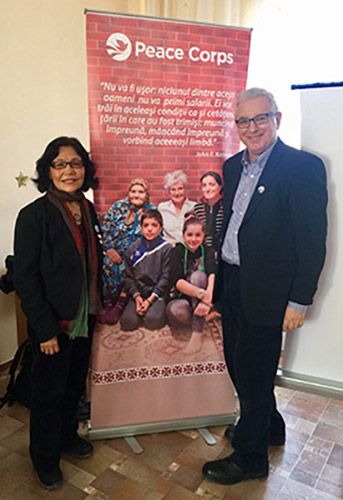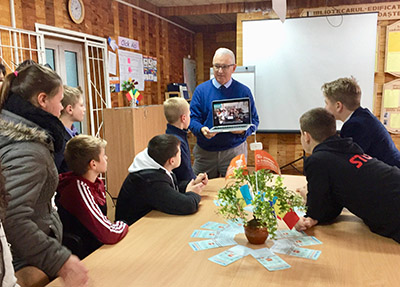Talking with David Jarmul (Nepal, Moldova)
Americans approaching retirement can redefine their lives and find new fulfillment by pursuing international adventure and service instead of drifting in their familiar jobs. That’s the message of Not Exactly Retired written by David Jarmul, who served as a PCV in Nepal from 1977 to 1979, where he met his wife, Champa, and at the age of 63 David rejoined the Peace Corps and Champa also became a PCV, and they went to Moldova from 2016 to 2018.
A graduate of Brown University and past president of the D.C. Science Writers Association, his previous books are Headline News, Science Views and Plain Talk: Clear Communication for International Development. David was the head of news and communications at Duke University for many years and held senior communications positions at the Howard Hughes Medical Institute and the National Academy of Sciences. He has also worked as an editor for an international development organization, a writer for the Voice of America, and a reporter for a business newspaper.
He and Champa live today in Durham, North Carolina.
Marian Haley Beil (Ethiopia 1962-64) interviewed David. Peace Corps Writers published his book, which is available from Amazon and independent bookshops. Note: JC
•
David — you’ve had a long history with Peace Corps, how did it start?
I was interested in the Peace Corps even in high school, where I organized a fund-raiser for one of our graduates who was serving in Niger. After college, I traveled with a friend across Asia and Africa, then returned to Nepal to serve as an English teacher with the Peace Corps.

Champa and David
That’s where I met my wife, Champa, a fellow teacher at the school where I was initially posted. We married, started a family and pursued conventional American lives for the next several decades, always dreaming about serving as Peace Corps Volunteers when we got older. After we turned sixty, we signed up to serve in Moldova, pursuing an adventure that would end up changing our lives.
What were your educational and work experiences prior to going to Moldova?
I graduated from Brown University; Champa graduated from the national university of Nepal. For both of us, that was a long time ago. She went on to become a Nepali literature teacher and, after coming to the United States, taught Nepali and worked as a medical sonographer.
I pursued a career as a writer and communications specialist for scientific and academic institutions. I spent my final fourteen work years as the head of news and communications at Duke University, dealing with everything from the controversy surrounding its lacrosse team to basketball championships, hurricanes, Nobel Prizes and a campus porn star.
I also was active in the Peace Corps community. I organized a big celebration at Duke for the 50th anniversary of Peace Corps, wrote an op-ed about Peace Corps in The New York Times and worked with NPCA on a project to encourage RPCVs to share their experiences in local newspapers. (Here’s a longer bio.)
What were your assignments in Moldova?
I was in the community and organizational development program in Moldova. Champa was an English teacher.

David with students
My initial job assignment was with a regional government office, then I transfered to the local public library. Overall, I had an excellent experience. Moldova’s libraries are struggling to redefine themselves in the internet age, with dusty collections of Soviet books and few resources. I worked with my library colleagues to start a computer coding class, a robotics team and an English conversation class. We launched several communications initiatives, such as a modern website, infographics and promotional videos. Our biggest project was to create a family room where kids could play while mothers took part in educational programs.
Beyond the library, I mentored young Moldovan entrepreneurs, led a PCV project to assist the national tourism industry, taught journalism workshops and produced a music video about our city. I also pursued the “third goal” by helping Peace Corps Moldova with its communications, writing for the NPCA’s WorldView magazine,making videos and blogging.
In addition to all of her teaching, Champa’s big project at her school was to create a gorgeous collection of costumes and props for the school’s drama program. She also organized an English conversation class at the library, volunteered at a center for kids with special needs, assisted young women at risk of trafficking and promoted composting.
Where did you live in Moldova?
Champa and I were posted to Ialoveni, a small city outside of Moldova’s capital, Chişinǎu. We lived on the second floor of our host family’s house, cooking for ourselves in a kitchen we shared. We became dear friends with our host family, especially our 87-year-old grandmother, or bunica, who became like a second mother to us. As an older married couple, we enjoyed taking care of ourselves while still being connected to a local family.
After COS?
We returned to our home in Durham, N.C. the summer before last (2018). We were content to spend the first several months hanging out with our two sons, their wives and our seven grandchildren. We’d missed them a lot, as well as our friends. We also needed time to adjust to the new realities of Trump America, not to mention beginning Medicare and Social Security.
Since then, I’ve been busy with three activities. First was writing this book. Second was getting involved with North Carolina’s partnership program with Moldova, where we served. Third was promoting an initiative in Durham and the Triangle to encourage retirees to serve as community volunteers. We’ve also become active again in the North Carolina Peace Corps Association, such as by hosting a Nepalese dinner and speaking about Moldova at an event. I also wrote a new article for WorldView, about two Durham RPCVs who recently began donating dozens of precious objects from their African art collection.
Describe Not Exactly Retired.
Not Exactly Retired is a love story spanning forty years and two Peace Corps countries, offering encouragement for anyone wondering how they, too, might pursue adventure, serve others, and redefine themselves for the next phase of their lives.
Why did you write this bookt?
Champa and I didn’t undertake our adventure with the idea it would lead to a book. We were just restless with our American lives and eager to travel and fulfill our dream of serving together in the Peace Corps. She had been taught by volunteers while growing up in Nepal, and I had served there in my twenties, so we already felt a close tie to the organization.
When we began our journey by traveling around the United States and Nepal, I started a blog to stay in touch with family and friends. Other people discovered the blog as well and, by the time we finished serving in Moldova, my posts and related videos had received more than 100,000 views among people in more than 100 countries. Most of them were older readers, but a surprising number were younger. They, too, were looking for ideas and inspiration about how to move beyond the conventional workplace to find fulfillment in their lives.
All of this feedback led me to begin writing a book after we returned home. I knew a book would need to be more than a mash-up of my blog posts. It had to work on its own terms, with a narrative arc and a story that kept readers engaged. I had a lot to say about Moldova, Nepal, the Peace Corps, and more, but I also wanted readers to enjoy the ride and ponder their own lives. I know future Peace Corps service is not a realistic option for many people, even within the RPCV community. People have jobs, family responsibilities, health problems, money concerns, and other constraints, and they all have their own dreams. The point I try to make in this book is not “Join the Peace Corps!” It’s to act on your life instead of drifting, regardless of whether you pursue service and adventure abroad, like we did, or something else.
I wrote the first draft of Not Exactly Retired in a couple of months. That may seem fast but I’m a former news office director who is used to writing stories within hours or even minutes. I’m very focused when I write and typically work in stretches of several hours, usually in the morning. My challenge with this book was not the writing per se but figuring out how to adapt more than 200 blog posts and other material to create a story that would flow narratively, not just chronologically.
I’ve been a member of a wonderful book club for many years in my home town of Durham. Everyone in it has worked as a writer, and many of them have written books. We’ve had many conversations about the challenges of adapting magazine articles or story collections into nonfiction books that stand on their own. I thought about those conversations many times as I worked on Not Exactly Retired. I was also fortunate to be able to call on some of these friends and other experienced writers and editors to review my drafts. Their feedback was immensely helpful and made the book better. It took me much longer to keep revising it than it did to write the initial draft.
What have you been doing to promote the book?
I have shared drafts of the book with several notable people who responded generously with promotional blurbs. Some of them have Peace Corps connections, like Marco Werman, the host of The World on public radio, and Kevin Quigley, the former president of the National Peace Corps Association. Others have followings within the nonfiction world, among adventure travelers, or in Moldova. I’ve also gotten some nice feedback from prominent bloggers.
I am officially publishing the book in April [2020], to coincide with National Volunteer Month. I’ve created a book website and have begun reaching out to magazines, television shows and bloggers with long “lead times” to suggest they produce a story about older Americans volunteering in the Peace Corps. There are so many people across our country who would be great Volunteers but who don’t know that the Peace Corps still exists, much less that they are eligible to serve in it. The Peace Corps should represent the full diversity of our country. As I saw for myself with my PCV colleagues in Moldova, older volunteers have so much to offer.
•
Not Exactly Retired: A Life-Changing Journey on the Road and in the Peace Corps
David Jarmul (Nepal 1977–79; Moldova 2016–18)
Peace Corps Writers
March 2020
300 pages
$15.00 (paperback), $9.99 (Kindle)
ACCEPTANCE SPEECH
I accept my ears that used to stick out & my chef-boss at Joseph’s in Boston called me “Clark” after Clark Gable (when I could hear better & are now closer to my balding head);
I accept my once nimble feet, the bottoms of which feel like cardboard in bed (I am glad however i have a nice bed);
I accept my polka-dotting memory called brown-outs or senior moments (& it may be all-for-the-best for some of them);
I accept the diabetes, the strictures, poor breathing, getting head, plus other aches (but I can still walk, eat. care);
I think of all the songs we sang with our folks. with dad thinking we seven kids were his very own barber-shop harmonizers;
& had I died young I could have avoided problems that arise; my life says more to me than my lists of sorrows & joys.
© Copyright Edward Mycue 28 Feb 2019